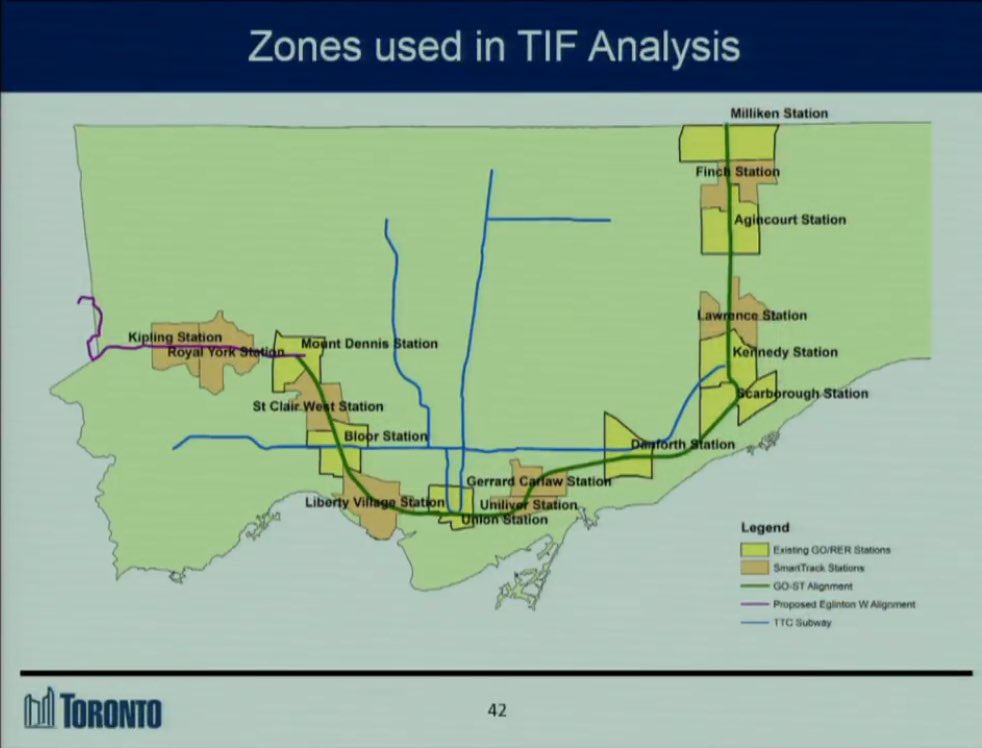Councillors had some tough questions for city staff at Tuesday's council meeting over the multi-billion dollar funding agreement to pay for Mayor John Tory's SmartTrack transit plan.
The meeting comes after executive committee last week
approved in principle the funding deal, which proposes that the city and province share costs.
Under the agreement, the city would pay $2 billion for six new SmartTrack stations and the Eglinton West LRT. That figure is contingent on $1.2 billion in assumed contributions by the federal government, as well as $470 million in assumed contributions from Mississauga and the Greater Toronto Airports Authority.
So far, Mississauga politicians, including Mayor Bonnie Crombie, have not committed to their proposed share of the cost.
The balance of the project's cost — about $3.7 billion — would come from the province.
Council is being asked to approve the plan ahead of a Nov. 30 deadline from the province and before councillors can agree on where Toronto's share of the funds will come from.
In addition to a 2.1 per cent property tax increase, the plan outlines other options for the city to shoulder its share, including tax increment financing (TIF), development charges, tax-supported debt financing and other measures.
'Limited capacity'
Following a short presentation of the plan by city manager Peter Wallace, councillors had several questions for city staff.
Coun. Giorgio Mammoliti asked which transit projects in the report could be funded without the city raising taxes or fees.
"Right now, we have limited capacity to build new transit lines without new sources of funding," a staffer told Mammoliti.
The councillor then wondered how he could be asked to vote in favour of a plan when the revenue streams to pay for it remain unclear, including how taxpayers would shoulder the costs.
He later told reporters that residents should be allowed to vote on whether or not taxes should go up to pay for the SmartTrack plan. He anticipates they will vote no.
"I don't get how you can pay for something without any money," Mammoliti said.
Coun. Janet Davis echoed Mammoliti's concerns, asking Tory during the debate about previous remarks in which he said he would not commit to transit projects when the costs and funding plans have not been decided.
Tory acknowledged that it's not ideal for councillors to vote on a plan before they can consider how to raise revenue to pay for it. But he noted that city staff will issue reports within the next two weeks, at which time he will make clear which revenue measures he supports.
'We had a choice'
During a break for lunch, Tory told reporters that the reason for the tight deadline is the fact that the province has to put out its proposal call to build stations as part of its own regional transit plan. The city saves time and money by piggybacking on that process, the mayor said.
"So we had a choice: we could be in the proposal call and include our six stations [for SmartTrack] and get on with picking someone, or we could be out of the process," Tory told reporters.
He said the plan calls for residents to pay "15 cents on the dollar" of a multi-billion dollar plan, "a very fair deal."
According to the city manager, because tax increment financing can't be relied upon to fund the plan fully, the shortfall calls for a 2 per cent property tax increase if other revenue streams can't be found.
To questions about revenue streams by other councillors, Wallace noted that "the city is starved for transit," which requires significant investment.
Tory said Tuesday he doesn't believe that revenue from property taxes can be used to fund massive infrastructure projects.
"We don't have to rely on property taxes, nor do I think we should," he said.






